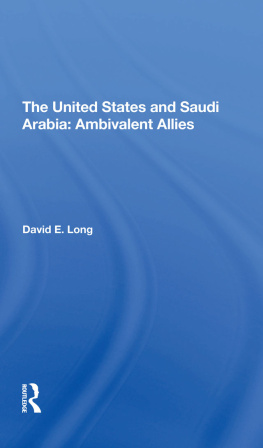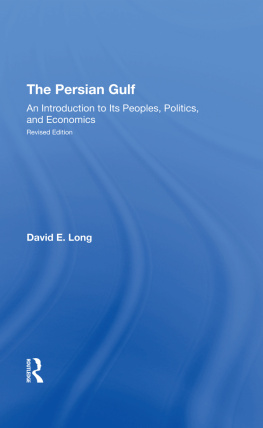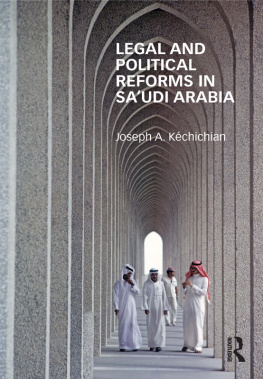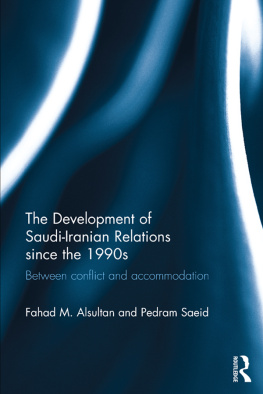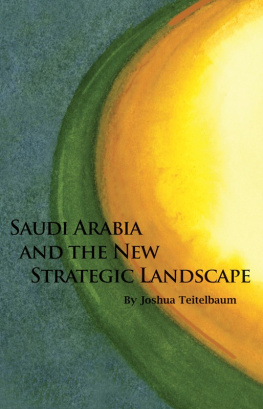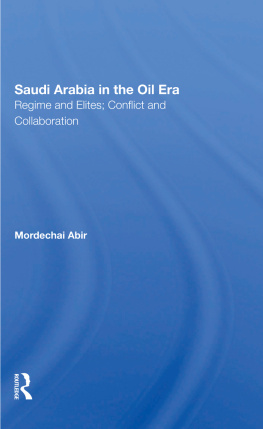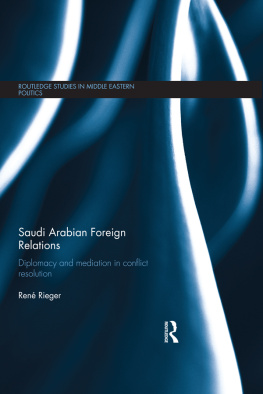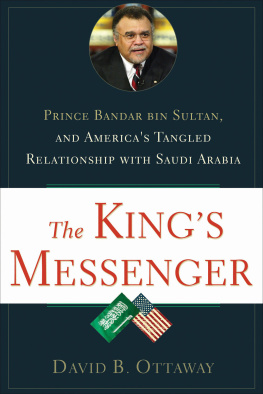The United States and Saudi Arabia: Ambivalent Allies
Also of Interest
The Foreign Policies of Arab States, Bahgat Korany and Ali E. Hillal Dessouki
Religion and State in the Kingdom of Saudi Arabia, Ayman Ali-Yassini
The Gulf and the Search for Strategic Stability: Saudi Arabia, the Military Balance in the Gulf, and Trends in the Arab-Israeli Military Balance, Anthony H. Cordesman
Political Adaptation in Sa'udi Arabia, Summer Scott Huyette
Security in the Middle East, edited by Samuel F. Wells, Jr., and Mark A. Bruzonsky
The Middle East Military Balance 1984, Mark A. Heller, Dov Tamari, and Zeev Eytan
The Arab World: An International Statistical Directory, Rodney Wilson
Local Politics and Development in the Middle East, edited by Louis J. Cantori and Iliya Harik
Middle East Politics: The Military Dimension, J. C. Hurewitz
The Government and Politics of the Middle East and North Africa, edited by David E. Long and Bernard Reich
Political Behavior in the Arab States, Tawfic E. Farah
Economic Diplomacy: The Political Dynamics of Oil Leverage, M. S. Daoudi and M. S. Dajani
OPEC, the Gulf, and the World Petroleum Market: A Study in Government Policy and Downstream Operations, Fereidun Fesharaki and David T. Isaak
Oil Strategy and Politics, 1941-1981, Walter J. Levy (edited by Melvin A. Conant)
Islam: Continuity and Change in the Modern World, John Obert Voll
Available in hardcover and paperback.
About the Book and Author
The United States and Saudi Arabia: Ambivalent Allies
David E. Long
U.S.-Saudi relations have been marked by ambivalence since their inception over 50 years ago. The Arab-Israeli conflict, the division between buyer and seller of oil, the superpower-small state dichotomy, and the divergence of cultures, traditions, and perceptions have all contributed to the anomalies that have marked the relationship between the two countries, although mutual interest has, over time, outweighed mutual antagonism. Dr. Long examines the major factors affecting their associationeconomic, commercial, military, and political as well as oil-related factorsand develops the thesis that each has evolved a unique internal dynamic and an existence independent of the others. It is primarily in times of crisis that the factors have overlapped in the minds of decision makers, Saudi and American alike. The author argues that a knowledge of the development of each individual element is crucial for understanding the intricacies of current U.S.-Saudi relations.
David E. Long is serving on the Secretary of State's Policy Planning Staff. He prepared this book while a senior fellow at the Middle East Research Institute, University of Pennsylvania. He is the author of The Persian Gulf: An Introduction to Its Peoples, Politics, and Economics (Westview, revised edition 1978), and coeditor of The Government and Politics of the Middle East and North Africa (Westview, 1980).
Published in cooperation with the Middle East Research Institute, University of Pennsylvania
The United States and Saudi Arabia: Ambivalent Allies
David E. Long
First published 1985 by Westview Press, Inc.
Published 2019 by Routledge
52 Vanderbilt Avenue, New York, NY 10017
2 Park Square, Milton Park, Abingdon, Oxon OX14 4RN
Routledge is an imprint of the Taylor & Francis Group, an informa business
Copyright 1985 Taylor & Francis
All rights reserved. No part of this book may be reprinted or reproduced or utilised in any form or by any electronic, mechanical, or other means, now known or hereafter invented, including photocopying and recording, or in any information storage or retrieval system, without permission in writing from the publishers.
Notice:
Product or corporate names may be trademarks or registered trademarks, and are used only for identification and explanation without intent to infringe.
Library of Congress Cataloging in Publication Data
Long, David E.
The United States and Saudi Arabia.
(MERI special studies series; no. 3)
Published in cooperation with the Middle East Research Institute, University of Pennsylvania.
Bibliography: p.
Includes index.
1. United StatesForeign relationsSaudi Arabia. 2. Saudi ArabiaForeign relationsUnited States. 3. United StatesForeign relations1945-I. Title. II. Series.
E183.8.S25L66 1985 327.73053'8 85-3270
ISBN 13: 978-0-367-29697-1 (hbk)
This book is dedicated to all the men and women of the United States and Saudi Arabia who have served their countries in the promotion of better U.S.-Saudi relations.
Communicating to a Western reader the nature of U.S. relations with a non-Western country is an awesome task. Understanding the issues is only part of the problem. The perceptions of those issues by citizens of the two nations are often, if not always, very different, and for a Westerner to attempt to understandmuch less communicateSaudi perceptions is little short of presumptuous. For example, there is a tendency, when analyzing Saudis' political behavior, implicitly to ascribe to them a Western mentality. Although this may not detract from understanding the issues, it does detract from understanding how Saudis view those issues, and hence why they did what they did or what they might do in the future. Thus, even though this is not a study of U.S.-Saudi political behavior (with a capital B), an attempt has been made to take account of behavioral factors implicit in the relationship.
An even more formidable problem is that of scope. In the totality of U.S.-Saudi relations, the major and positive role of private U.S. companies, particularly Aramco, is virtually unique; the person-to-person relationships of private Americans in Saudi Arabia and of Saudis in the United States, principally in colleges and universities, have also been important. Given the paucity of research on official relations, however, and their key importance in understanding the nature and direction of the overall relationship, I thought it more useful to leave U.S. private-sector relations with Saudi Arabia to others and to limit the scope of this study to government-to-government relations.
A final conceptual problem involves the methodological approach to the subject. I settled on a historical approach because although the continuities of U.S.-Saudi relations are not well known, they are central to understanding the nature and direction of current and ongoing relations. All too often, policy debate in the United States over U.S.-Saudi relations has been severely restricted by this lack of a historical dimension. For example, the congressional debates over the U.S. sale of F-15 aircraft to Saudi Arabia in 1978 and AWACS aircraft in 1982 paid scant attention to historical developments. Both sales can be linked directly to a U.S. promise made in 1963 to conduct an air defense survey for Saudi Arabia if King Faysal would agree to a settlement with Egypt's President Nasser over the Yemeni Civil War. The agreement was stillborn, but the survey was duly made, and from it came the long series of largely U.S.-recommended efforts to improve Saudi air defenses that ultimately led to the purchase of F-15s and AWACS. The level and rate of development toward those systems was known, at least in a general way, years before the sales were ever made.

